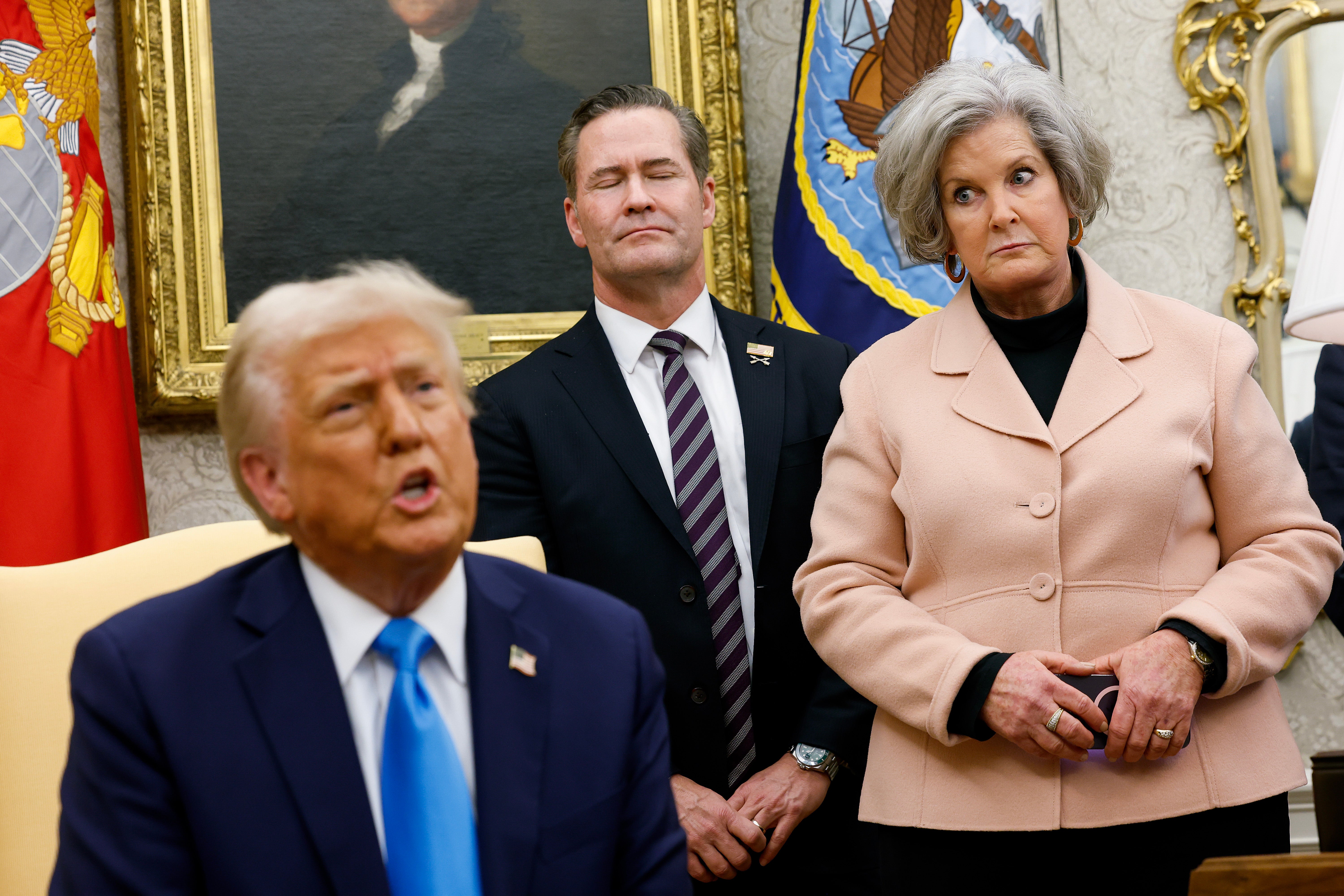ARTICLE AD BOX
There was zero doubt as to which faction of the modern-day Republican Party felt like it came out ahead on Thursday after the announcement that Mike Waltz, President Donald Trump’s national security adviser, was out of his job.
“SCALP,” declared conspiracy theory-lover and right-wing activist Laura Loomer in a tweet posted after reports of his removal as NSA and shortly before news that he would be moved to the now-vacant position of ambassador to the United Nations.
The writing was on the wall for Waltz long before news of his imminent ouster from his security role broke on Thursday. His new position puts him out of the White House, and out of Trump’s inner circle of advisers.
The late-March revelation that he had nearly singlehandedly caused the second Trump administration’s first real scandal of 2025 by accidentally adding the editor-in-chief of The Atlantic to a group chat about an imminent military attack in Yemen, was always seen as a greater unforced error for the administration than any of the damaging headlines in the days following which conveniently surrounded a top Waltz rival in the administration, Defense Secretary Pete Hegseth.
And that’s likely the key to understanding the national security adviser’s move. More than anyone else in the White House or broader administration, Waltz suffered under the image of being a suspected leaker — something Trump and his lackeys hate more than just about anything. News of his fate on Thursday came just one day after a piece critical of a man floated as his replacement, Steve Witkoff, was published in the New York Post citing unnamed administration sources decrying his effectiveness in negotiations with Iran and Russia.
The paper quoted a member of Trump’s first administration saying of Witkoff: “Nice guy, but a bumbling f***ing idiot.”

Waltz, according to CNN’s Kaitlan Collins, was “fighting [for his job] all week” and in early April he was seemingly the target of a declaration of war from Loomer, who has organized a new far-right outfit aimed at hunting down leakers and other administration officials seen as disloyal to the president. Loomer stormed into the White House (at Trump’s invitation) and presented the president with a list of names of staffers, including several under Waltz’s direction at the national security council. Within hours, they were sacked.
Loomer has been publicly calling for Alex Wong, Waltz’s top deputy also reported to be getting the boot, to be ousted since March. In a lengthy tweet two days after The Atlantic’s editor-in-chief published a story detailing the contents of the Signal chain involving Waltz and other top administration officials, Loomer released a lengthy statement identifying Wong’s wife Candace Chiu Wong as a former US attorney invovled in prosecuting January 6 rioters. New York Magazine reported that Loomer pushed directly for Wong and Waltz to be fired during her meeting with Trump.
And in a recent interview with journalist Tara Pamieri, Loomer explained that she had nearly shown Trump a video of Waltz, a former congressman from Florida, denouncing the president’s comments about servicemembers following the then-Republican candidate’s 2015 attack on Senator John McCain, who had survived years in a Vietnamese prison camp: “He’s not a war hero,” said Trump, who had avoided serving in Vietnam. “He was a war hero because he was captured. I like people who weren’t captured.”
Loomer said she was only prevented from showing the video to the president because Waltz himself happened to walk into the room.
The reasoning for trying to ditch Waltz seems clear: MAGA loyalists, partly out of their own long-held disdain for “establishment” Republican figures and partly out of a desire to protect Hegseth and others seen as their allies, turned fire on him as soon as Signalgate erupted. And the combination of Waltz’s own role in that scandal and his reputation as a possible leaker meant he had no support from the president or his closest circle, including White House chief of staff Susie Wiles.

The real question is whether Trump, by ousting his national security adviser, is making a true final pivot away from that GOP establishment. Some of his outside observers and allies seem to think so.
“The Waltz ejection was nigh inevitable — Signalgate was open, opera bouffe incompetence (and then he baldly lied about it). But the apparent sacking of Alex Wong, an arch-hawk former Cotton and Romney staffer, signals a wider *ideological* reshuffle, as well,” wrote Curt Mills, executive director of The American Conservative magazine.
As The Independent reported previously, the debate over Waltz and Hegseth’s roles in Signalgate was swept up in a broader discussion over the second Trump administration’s posture towards Iran. Though Trump, begrudgingly according to reports, reinstated his “maximum pressure” campaign in February, his Middle East envoy Witkoff is now engaged in the first talks aimed at reaching an agreement to constrain Iran’s nuclear weapons program since the Obama era.
That conversation pitted Waltz against the faction of the GOP more closely aligned with Trumpworld that views foreign military intervention with skepticism. And many indirectly accused him of weaponizing the press against his ideological foes within the administration.
“Just days after media reported that Defense Secretary Pete Hegseth discouraged President Trump from attacking Iran, multiple media stories have dropped claiming incompetence and worse on his part,” wrote Ron Paul, long an icon of libertarian-ish Republicans, on Twitter, adding: “Is Hegseth about to learn what happens when you cross the neocons?”

Trump, at the urging of natsec hawks like Mike Pompeo, Lindsey Graham and others, ripped up the 2015 Iran nuclear agreement known as the JCPOA shortly after taking office last time around. In 2025, he is taking a markedly different course as he threatens Iran to come to the table while at the same time reportedly waving off voices urging him towards direct military action — voices which include the Israeli government.
Waltz’s departure from the White House, along with Wong’s, is likely to be a further blow for supporters of Ukraine and US involvement in Europe going forward. The national security adviser was one of the most vocal supporters of Ukraine among Trump’s senior foreign policy staffers, having called for the Biden administration to take an even tougher stance against Russia during his time in the House.
His demotion also marks the second time a Trump administration has begun with the purging of its own national security adviser within the first few months of being in office.
Michael Flynn, who served during Trump’s first term, resigned after just 23 days on the job after it was revealed that he’d lied to Vice President Mike Pence about his contacts with Russia’s ambassador to the US. He went on to become a QAnon conspiracist and called on Trump to institute martial law during his attempts to overturn the 2020 election based on falsehoods.









 English (US) ·
English (US) ·